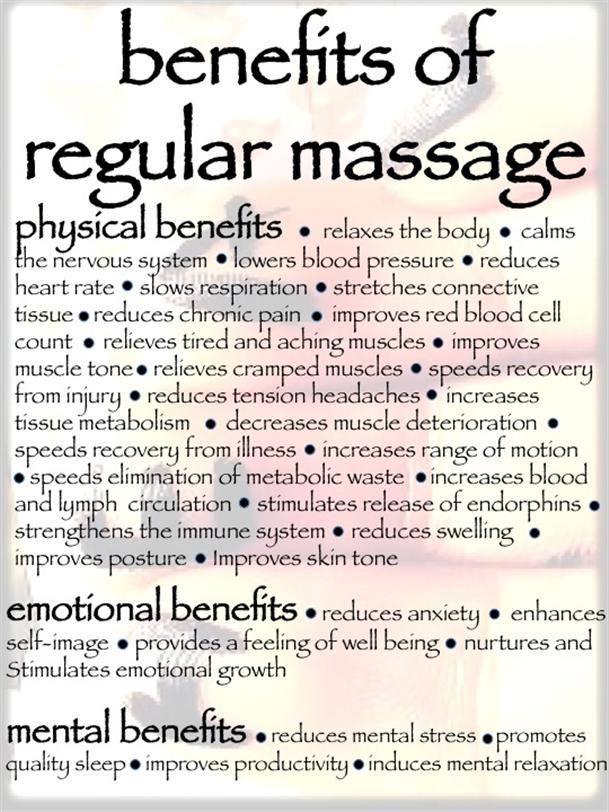Imagine a world where you can unwind from the daily stresses and nourish your body, mind, and soul all at once. The answer lies in the magic of massage therapy. Struggling with tension, aches, or simply needing a moment of self-care? Massage is the ultimate key to unlocking a multitude of benefits for your body. From relaxation to improved circulation, increased flexibility to reduced anxiety, the wonders of a rejuvenating massage are countless. In this article, we will explore the incredible advantages that this hands-on healing practice can bring to your body and overall well-being. So, take a deep breath, let your worries fade away, and discover how a massage can be your body’s best friend.
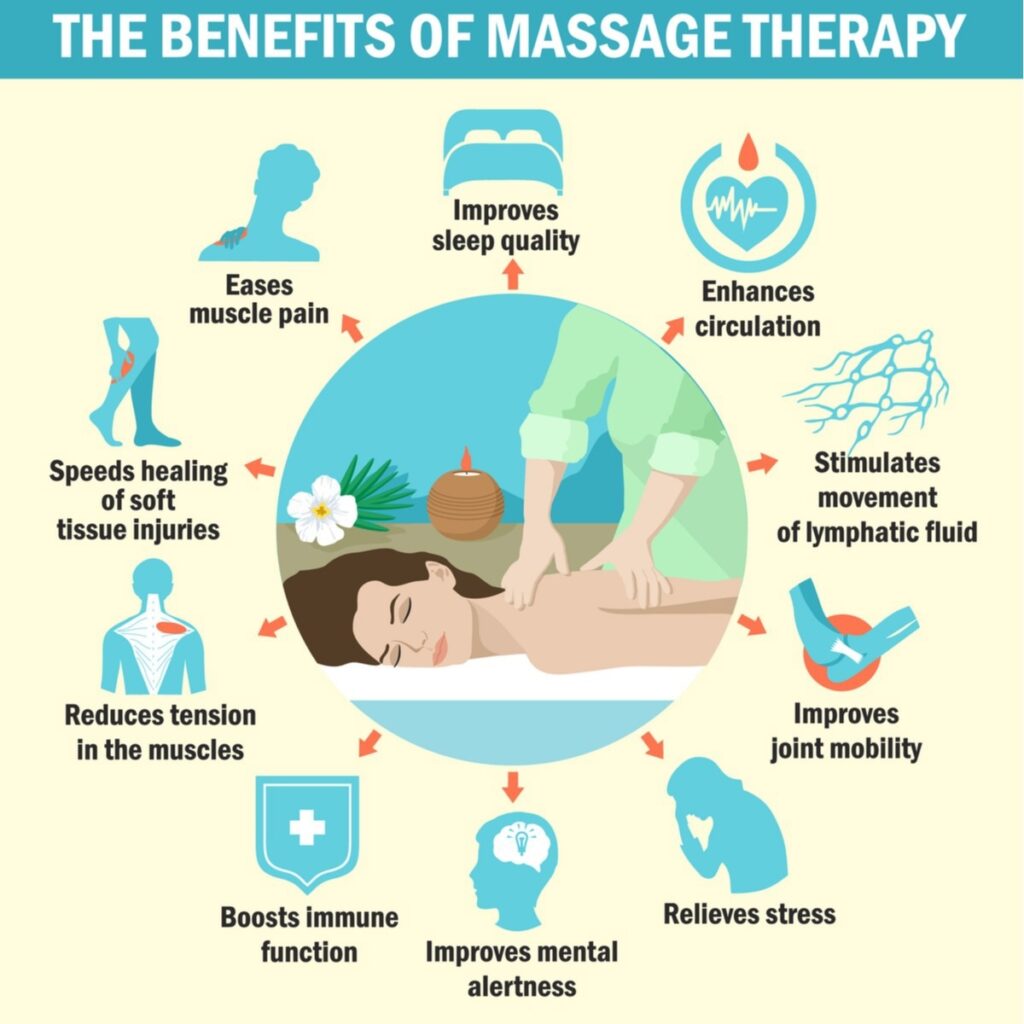
This image is property of d2jx2rerrg6sh3.cloudfront.net.
Physical Benefits
Relieves Muscle Tension
Massage therapy is known for its ability to relieve muscle tension and promote relaxation. When muscles are overworked or stressed, they can become tight and sore. By using various massage techniques, such as kneading, tapping, and stretching, a skilled massage therapist can help release tension in the muscles and promote a sense of calm and relaxation.
Improves Blood Circulation
One of the significant benefits of massage is its ability to improve blood circulation throughout the body. The pressure applied during a massage helps to stimulate blood flow to the muscles and tissues, delivering much-needed oxygen and nutrients. Improved circulation can also aid in the removal of waste products and toxins from the body, leading to enhanced overall health and vitality.
Reduces Pain and Inflammation
Massage therapy can effectively reduce pain and inflammation in the body. Through the application of pressure and manipulation techniques, massage can help alleviate pain caused by muscle tension, injury, or chronic conditions such as arthritis. Additionally, the increased blood flow and release of endorphins during a massage can provide natural pain relief and promote a sense of well-being.
Enhances Flexibility and Range of Motion
Regular massage sessions can significantly enhance flexibility and range of motion in the body. Through stretching and joint mobilization techniques, a massage therapist can help loosen tight muscles, improve muscle elasticity, and increase joint mobility. Improved flexibility and range of motion can prevent injuries, enhance athletic performance, and promote a healthier, more active lifestyle.
Stimulates the Lymphatic System
The lymphatic system plays a crucial role in maintaining a healthy immune system and removing toxins from the body. Massage therapy can stimulate the lymphatic system, helping to increase the flow of lymph fluid and remove waste products and toxins more efficiently. By promoting lymphatic drainage, massage can support the body’s detoxification process and strengthen the immune system.
Mental and Emotional Benefits
Reduces Stress and Anxiety
In today’s fast-paced world, stress and anxiety have become prevalent issues affecting many individuals. Massage therapy offers a natural and effective way to reduce stress levels and promote relaxation. The soothing touch of a massage therapist can help calm the nervous system, lower cortisol levels, and increase the production of serotonin and dopamine – neurotransmitters that promote feelings of happiness and well-being.
Promotes Relaxation and Improved Sleep
Massage has a deeply relaxing effect on both the mind and body, making it an excellent tool for improving sleep quality. The release of tension and stress during a massage can help induce a state of deep relaxation, enabling individuals to fall asleep quicker and experience more restful sleep. The improved sleep quality contributes to an overall sense of well-being and vitality.
Alleviates Symptoms of Depression
Depression is a serious mental health condition that affects millions of people worldwide. Massage therapy can be a valuable complementary treatment in alleviating its symptoms. By promoting relaxation and reducing stress hormones, massage can help boost mood, increase feelings of happiness, and provide a sense of comfort and emotional support.
Boosts Mood and Overall Well-being
Regular massages have been shown to have a positive impact on mood and overall well-being. The release of endorphins and serotonin during a massage can elevate mood, reduce anxiety, and improve emotional well-being. The physical sensation of touch during a massage can also create a sense of comfort and connection, helping individuals feel more grounded and content.
Enhances Mental Clarity and Focus
Massage therapy can enhance mental clarity and focus by reducing mental fatigue and promoting relaxation. The increased blood flow and oxygenation to the brain during a massage can improve cognitive function, concentration, and memory. Massage sessions can provide individuals with a much-needed break from the demands of daily life and help them recharge mentally and emotionally.
Improved Posture and Alignment
Relieves Muscular Imbalances
Muscular imbalances, often caused by poor posture or repetitive motions, can lead to discomfort and pain. Massage therapy can help relieve these imbalances by targeting specific muscle groups and releasing tension and knots. By addressing muscular imbalances, massage can improve posture and alignment and reduce the risk of chronic pain and injury.
Corrects Postural Dysfunctions
Poor posture can have a detrimental effect on the body, leading to muscle imbalances, joint misalignments, and chronic pain. Massage therapy can help correct postural dysfunctions by targeting the muscles and connective tissues affected by poor alignment. By releasing tension and improving muscle flexibility, massage can assist in achieving better posture and overall body alignment.
Realigns the Spine and Joints
Misalignments in the spine and joints can cause pain, limited range of motion, and reduced overall function. Massage therapy can help realign the spine and joints by releasing tension and restoring balance to the surrounding muscles and connective tissues. Through the application of targeted pressure and mobilization techniques, a skilled massage therapist can help improve joint mobility and alleviate pain associated with misalignments.
Promotes Better Body Awareness
Massage therapy can promote better body awareness by bringing attention to areas of tension, discomfort, or restricted movement. A massage therapist can provide valuable feedback on posture, movement patterns, and body mechanics, helping individuals become more mindful of their bodies and make necessary changes to improve overall well-being.
Prevents Chronic Pain and Injury
Regular massage therapy can play a crucial role in preventing chronic pain and injury. By addressing muscle imbalances, improving flexibility, and promoting proper alignment, massage can help reduce the risk of injuries caused by overuse, repetitive motions, or poor posture. By maintaining healthy muscles and connective tissues, individuals can enjoy an active lifestyle with reduced pain and a lower risk of chronic conditions.
Boosted Immune System
Increases Circulation of White Blood Cells
The immune system is essential for protecting the body against harmful bacteria, viruses, and infections. Massage therapy can boost the immune system by increasing the circulation of white blood cells – the immune cells responsible for fighting off pathogens. The improved circulation ensures that white blood cells reach the necessary areas more efficiently, enhancing the body’s defense mechanisms.
Enhances Lymphatic Flow
The lymphatic system plays a crucial role in immune function and detoxification. Massage therapy can enhance lymphatic flow, encouraging the movement of lymph fluid and the elimination of waste products and toxins. By supporting the lymphatic system, massage can help strengthen the immune system and improve overall health and well-being.
Improves Detoxification and Waste Removal
Toxins and waste products can accumulate in the body and hinder its optimal functioning. Massage therapy can aid in the detoxification process by increasing circulation, stimulating lymphatic flow, and promoting the elimination of waste. By assisting the body in removing toxins, massage can contribute to improved immune function and overall health.
Stimulates the Release of Natural Killer Cells
Natural Killer (NK) cells are an essential component of the immune system, responsible for identifying and eliminating virus-infected cells and cancerous cells. Massage therapy has been shown to stimulate the release of NK cells, enhancing the body’s ability to fight off harmful pathogens and abnormal cells. By boosting NK cell activity, massage can support a strong immune response.
Strengthens the Body’s Defense Mechanisms
Massage therapy has been found to have a positive impact on the body’s defense mechanisms. By reducing stress, lowering cortisol levels, and promoting relaxation, massage can help maintain a healthy immune system. A well-functioning immune system is better equipped to fight off infections and illnesses, leading to improved overall health and well-being.
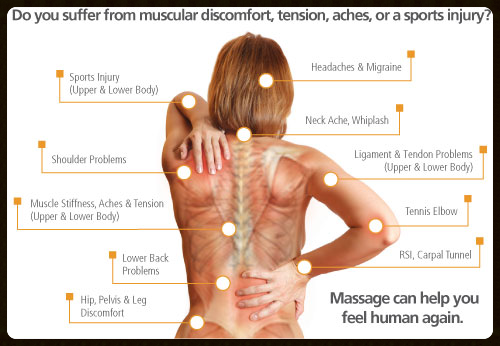
This image is property of bodysmarthealth.com.
Reduced Headaches and Migraines
Relieves Tension and Trigger Points in the Neck and Shoulders
Tension and trigger points in the neck and shoulders are common causes of headaches and migraines. Massage therapy can target these areas and provide targeted relief. By applying pressure and using specific techniques, a massage therapist can release tension and trigger points, alleviating headache symptoms and promoting relaxation.
Alleviates Muscle Spasms and Knots
Muscle spasms and knots in the neck and shoulders can be incredibly uncomfortable and contribute to headache and migraine episodes. Massage therapy can effectively alleviate muscle spasms and knots by applying targeted pressure and using techniques such as deep tissue massage and trigger point therapy. The release of tension and muscle tightness can provide relief from headaches and promote a sense of ease.
Improves Blood and Oxygen Flow to the Head
Massage therapy can improve blood and oxygen flow to the head, which is crucial for relieving headaches and migraines. By increasing circulation to the head and neck area, massage can help reduce inflammation and promote relaxation. The improved blood flow can also provide the necessary oxygen and nutrients to the brain, supporting headache relief and improved overall well-being.
Decreases Frequency and Intensity of Headaches
Regular massage therapy can help decrease the frequency and intensity of headaches and migraines. By addressing tension, trigger points, and muscle imbalances, massage can provide long-lasting relief and prevent the onset of headaches. The relaxation and stress relief provided by massage therapy can also reduce headache triggers and contribute to a better quality of life.
Provides Relaxation and Stress Relief
Stress and tension can be significant contributors to headaches and migraines. Massage therapy offers a natural and effective way to promote relaxation and reduce stress levels. The soothing touch of a massage therapist, combined with the release of endorphins during a massage, can provide relaxation and stress relief, reducing the likelihood of headache and migraine episodes.
Improved Digestive System
Promotes Healthy Digestion and Absorption of Nutrients
A healthy digestive system is essential for overall well-being, as it allows the body to properly process and absorb nutrients from food. Massage therapy can promote healthy digestion by stimulating the digestive organs and enhancing their function. Through specific techniques and pressure applied to the abdomen, massage can help optimize digestion, leading to improved nutrient absorption and better overall health.
Enhances Peristalsis and Smooth Muscle Contractions
Peristalsis refers to the wave-like contractions of the smooth muscles in the digestive tract that propel food through the digestive system. Massage therapy can enhance peristalsis and smooth muscle contractions, promoting efficient digestion and preventing issues such as constipation. By improving the movement of food through the digestive system, massage can contribute to a healthier digestive process.
Reduces Symptoms of Digestive Disorders
Massage therapy can be beneficial for individuals with digestive disorders such as irritable bowel syndrome (IBS) or acid reflux. By reducing muscle tension and promoting relaxation, massage can alleviate the symptoms associated with these conditions, including abdominal pain, bloating, and discomfort. The gentle pressure applied during a massage can also soothe inflamed tissues and contribute to improved digestive function.
Relieves Abdominal Tension and Bloating
Abdominal tension and bloating can be uncomfortable and disruptive to daily life. Massage therapy can provide relief from these symptoms by releasing tension in the abdomen and promoting relaxation. The gentle circular motions and targeted pressure used during a massage can help reduce abdominal discomfort, bloating, and cramping, allowing for improved comfort and digestion.
Stimulates the Parasympathetic Nervous System
The parasympathetic nervous system is responsible for the rest and digest response in the body. Massage therapy can stimulate the parasympathetic nervous system, promoting a state of relaxation and allowing the body to enter a more optimal state for digestion. By activating the parasympathetic response, massage can support healthy digestion and overall digestive system function.
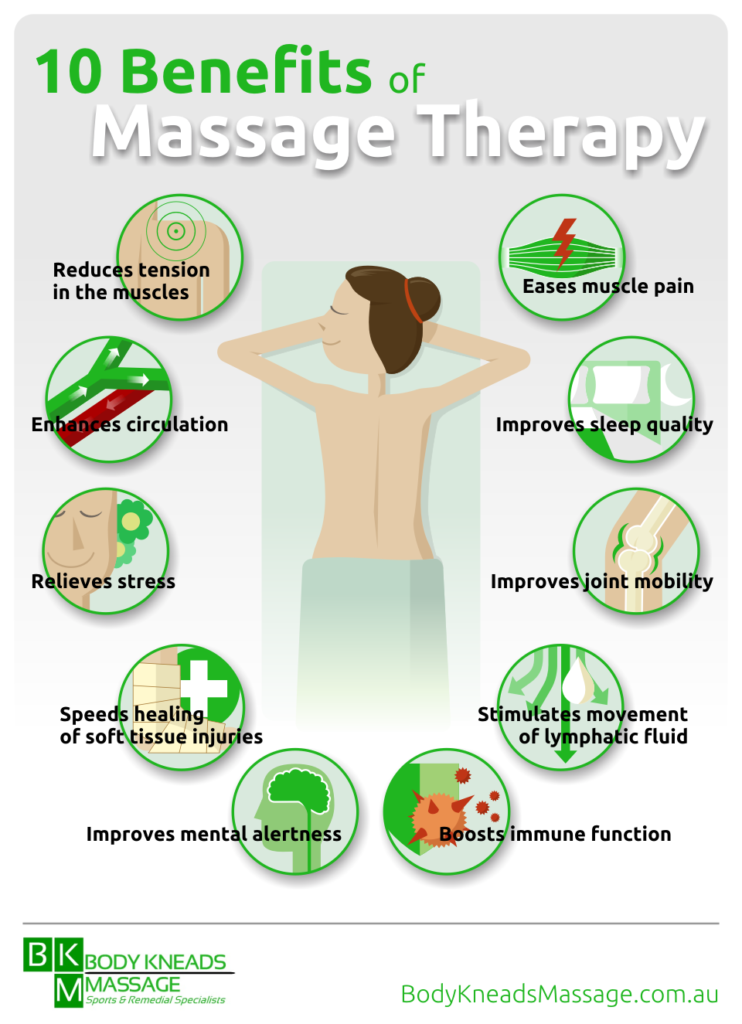
This image is property of bodykneadsmassage.com.au.
Injury Rehabilitation and Prevention
Accelerates Healing Process
Massage therapy can significantly accelerate the healing process for various types of injuries. By increasing blood flow to the injured area, massage promotes the delivery of oxygen and nutrients necessary for tissue repair. Through targeted massage techniques, tension and scar tissue can be reduced, allowing for quicker healing and minimizing the risk of complications.
Reduces Scar Tissue Formation
Scar tissue can develop as a result of injuries, surgeries, or repetitive movements. While scar tissue is a natural part of the healing process, excessive build-up can lead to pain, restricted movement, and impaired function. Massage therapy can help reduce scar tissue formation by breaking down adhesions and promoting proper alignment of newly formed tissue. This can result in improved mobility and reduced discomfort.
Increases Joint Flexibility and Range of Motion
Joint stiffness and limited range of motion are common issues following an injury or prolonged immobility. Massage therapy can help increase joint flexibility and range of motion by addressing muscle imbalances, reducing tension, and improving blood flow to the affected areas. By restoring proper movement in the joints, massage can aid in the recovery process and prevent further injury.
Prevents Muscular Imbalances and Compensation Patterns
When one area of the body is injured, the surrounding muscles may compensate, leading to imbalances and altered movement patterns. Massage therapy can help prevent these muscular imbalances by addressing tension, promoting relaxation, and restoring proper muscle function. By addressing both the injured area and the surrounding muscles, massage can contribute to a more balanced and coordinated movement.
Facilitates Recovery and Prevents Recurring Injuries
Massage therapy plays a crucial role in facilitating the recovery process and preventing recurring injuries. By promoting blood circulation, reducing muscle tension, and improving flexibility, massage can enhance tissue healing and decrease the risk of reinjury. Regular massage sessions can help maintain optimal muscle and joint function, allowing individuals to enjoy an active lifestyle with reduced risk of future injuries.
Improved Skin Health
Increases Blood Flow and Oxygenation to the Skin
Massage therapy can enhance the health and appearance of the skin by increasing blood flow and oxygenation to skin cells. The manual manipulation of the skin during a massage helps to stimulate circulation, delivering vital nutrients and oxygen to the skin. Improved blood flow can contribute to a healthy complexion, improved skin tone, and a natural radiance.
Enhances Nutrient Delivery to Skin Cells
The skin requires a constant supply of nutrients to maintain its health and vitality. Massage therapy can enhance nutrient delivery to the skin cells by promoting blood flow and lymphatic drainage. The increased circulation ensures that the skin receives an adequate supply of nutrients, resulting in improved skin health, texture, and overall appearance.
Promotes Cell Regeneration and Renewal
Healthy cell regeneration and renewal are essential for maintaining youthful-looking skin. Massage therapy can promote cell regeneration and renewal by improving blood circulation, stimulating collagen production, and increasing the turnover of skin cells. By promoting a more rapid regeneration process, massage can contribute to a more youthful and radiant complexion.
Stimulates Collagen Production
Collagen is a protein that plays a crucial role in maintaining the strength, elasticity, and integrity of the skin. Massage therapy can stimulate collagen production by promoting blood circulation and lymphatic flow. The increased collagen production contributes to firmer, plumper skin with improved elasticity, reducing the appearance of wrinkles and fine lines.
Improves Skin Smoothness and Texture
Massage therapy can improve the smoothness and texture of the skin by encouraging the removal of dead skin cells and facilitating the turnover of new cells. The gentle exfoliation and stimulation provided during a massage can help slough off dull, dead skin and reveal a fresh, radiant complexion. Regular massages can contribute to smoother, softer skin with a more even tone and texture.
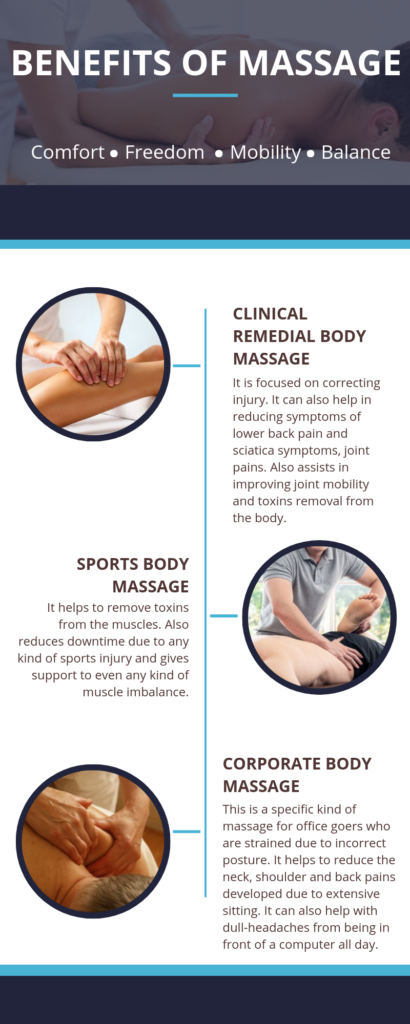
This image is property of advanced-health.com.au.
Lowered Blood Pressure
Reduces Stress and Anxiety Levels
Stress and anxiety can have a significant impact on blood pressure levels. Massage therapy can help reduce stress and anxiety by promoting relaxation, lowering cortisol levels, and increasing the production of serotonin and dopamine – neurotransmitters associated with feelings of happiness and calm. By reducing stress levels, massage can contribute to significant reductions in blood pressure.
Promotes Relaxation and Serotonin Release
Massage therapy has a profound ability to promote relaxation and trigger the release of serotonin – a neurotransmitter that helps regulate mood and blood pressure. The gentle, soothing touch of a massage therapist combined with the release of endorphins can induce a state of deep relaxation, lowering blood pressure and promoting a sense of well-being.
Lowers Heart Rate and Blood Pressure
Studies have shown that massage therapy can lower both heart rate and blood pressure. The calming effect of massage on the nervous system helps to reduce the fight-or-flight response and allow the body to enter a state of relaxation. By promoting a slower heart rate and healthy blood pressure levels, massage can significantly contribute to improved cardiovascular health.
Improves Cardiovascular Health
Massage therapy offers numerous benefits for cardiovascular health. The improved blood circulation resulting from massage helps to deliver oxygen and nutrients to the body’s tissues, including the heart. Additionally, massage can enhance the efficiency of the circulatory system, reducing the workload on the heart and contributing to overall cardiovascular health.
Reduces the Risk of Cardiovascular Diseases
High blood pressure and stress are significant risk factors for the development of cardiovascular diseases. Massage therapy can help reduce these risk factors by lowering blood pressure, promoting relaxation, and reducing stress and anxiety levels. By incorporating regular massages into a healthy lifestyle, individuals can significantly reduce their risk of cardiovascular diseases.
Conclusion
Massage therapy offers numerous benefits for both the body and mind. From relieving muscle tension and reducing pain to promoting relaxation and improving sleep, massage has a positive impact on overall health and well-being. By enhancing posture and alignment, boosting the immune system, reducing headaches, improving digestion, aiding in injury rehabilitation, enhancing skin health, lowering blood pressure, and promoting general wellness, massage therapy should be integrated into a healthy lifestyle for maximum benefits. It is crucial to find a qualified and experienced massage therapist who can tailor treatments to your specific needs and goals. So, why wait? Experience the positive effects of massage therapy today and embark on a journey towards improved health and well-being!

This image is property of www.alldeepmassage.com.
